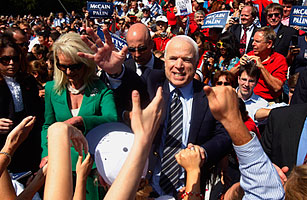
John and Cindy McCain wave to a crowd gathered in Fairfax, Va.
Steve Schmidt, John McCain's bald-headed message maven, made his first mark on national politics in the Bush-Cheney war room in 2004. Schmidt specialized in the generous dispersal of indignation — like a friendly neighbor handing out Halloween candy — to a quote-hungry press. "It is simply outrageous that John Kerry is questioning people's patriotism," he told the New York Times in April of that year. "John Kerry will say anything for his political benefit," he told Reuters that October. "Now his campaign surrogates have taken those attacks to a new low," he told the Philadelphia Inquirer that November.
In the heat of a campaign, Schmidt understood that outrage could cut through the news clutter like a buzz saw. It didn't matter much if the outrage was fueled by fact — better if it was fueled by emotion, which would tweak the fury of his base, leading to exciting exchanges on cable television and fresh chatter around the watercooler. Unlike health care or foreign policy, the emotional charge of outrage has a magnetic effect; voters are forced to take sides and respond, shifting the debate.
Now, four years later, Schmidt and the McCain campaign have returned to outrage, and there is little doubt that the tactic is again having the desired effect. Two weeks ago, the McCain campaign crowed about the alleged mistreatment that the press and the Barack Obama campaign were heaping on Alaska governor Sarah Palin (at roughly the same time that the campaign sent out e-mail blasts featuring enthusiastic media blurbs of Palin's convention speech). After the convention, the indignation only intensified; in the course of 24 hours, McCain accused Obama of supporting "sex education" for kindergarten students and referring to Palin as a pig wearing lipstick. "The McCain campaign baited the outrage hook, and the Obama campaign and the national media bit," says Todd Harris, a Republican political consultant who worked for McCain in 2000 and Fred Thompson in 2008. "Hats off to the McCain guys for completely throwing Obama off."
The charges were incendiary enough to shift the discussion, forcing Obama off message and into a defensive posture. By week's end, he had declared his intention to run a more aggressive campaign. But in the meantime, Obama had to defend himself against charges of sexism at a Virginia library appearance that was originally designed to increase his appeal among women voters. It almost did not matter that McCain had prompted a backlash from the members of the press who repeatedly pointed out that both claims were wildly misleading. The sex-education bill in question had called only for age-appropriate instruction, and there is no evidence that Obama's use of the phrase "lipstick on a pig" referred to Palin. At the time he used the phrase, he was discussing the similarity of McCain's policies to those of President Bush.
In late July, the McCain campaign had demonstrated that it could also shake up the presidential race by deploying outrage's lesser twin: outrageousness. In a set of advertisements for both the Internet and television, the campaign compared Obama to Britney Spears, Paris Hilton and even Moses, mocking Obama's "celebrity" in a way that was both controversial and certain to grab lots of free airtime.
Meanwhile, the Obama campaign, which prides itself on running on an even keel, has rarely tried to push the same emotional buttons. The only comparable effort came shortly before the Democratic Convention, when the campaign latched onto McCain's admission in an interview that he did not know how many houses he owned with his wife, who is heir to a considerable fortune.
Then last week, the Obama campaign shifted gears, launching two new negative attacks on McCain, one suggesting that he was old by highlighting his time in Washington and his unfamiliarity with e-mail. The second, which focused on the number of former lobbyists who volunteer or work for the McCain campaign, misled viewers by suggesting that these officials still lobbied for special interests.
Neither attack was outraged or outrageous enough to create a new political conversation, let alone a tangent. This imbalance has caused some soul-searching and second-guessing in newsrooms as reporters realize they are being successfully manipulated by the McCain campaign. "Stop the madness," said TIME's own Mark Halperin in an appearance on CNN to discuss the controversy. "I think this is the press just absolutely playing into the McCain campaign's crocodile tears."
By the weekend, many news organizations had mounted a backlash of their own, running prominent pieces accusing the self-branded "straight-talking" McCain of deceiving voters. "The 'Straight-Talk Express' has detoured into doublespeak," announced the Associated Press, while the New York Times blared, "McCain Barbs Stirring Outcry as Distortions."
The backlash has not yet had an impact on voters' perceptions of McCain's credibility, though with the press emboldened, that could change. But to date, the numbers don't show it. In late July, the Real Clear Politics average of McCain's favorability rating stood at 53%, with 34% of voters saying they held an unfavorable view of McCain. Since then, his favorability rating has gone up three points while his unfavorability number has gone up just more than a point.
Over the same period, the favorability rating for Obama has remained constant at 55% while his unfavorability has increased by more than three points, to 37%. Regardless of who prevails in November, one thing is certain: Steve Schmidt, lord of outrage, has a long and prosperous career ahead of him.
